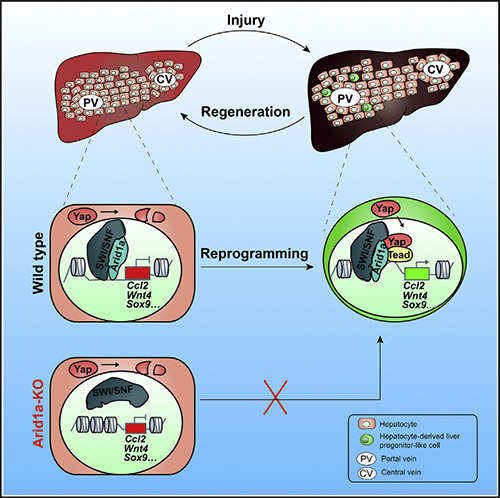

Mammalian organs comprise an extraordinary diversity of cell and tissue types. Following injury, differentiated epithelial cells can serve as a stem cell-independent source for tissue regeneration by undergoing reprogramming into other cell types. However, the intrinsic molecular basis underlying plasticity of differentiated cells remains largely unaddressed.
On July 3rd, 2019, a research paper named “A Homeostatic Arid1a-Dependent Permissive Chromatin State Licenses Hepatocyte Responsiveness to Liver-Injury-Associated YAP Signaling” was published in Cell Stem Cell. This work indicates an intrinsic epigenetic basis underlying hepatocyte competence in responding to regenerative signals in injury, which may help us to understand cell plasticity in other epithelial tissues.
This research was jointly accomplished by Prof. Hui Lijian’s group at the Shanghai Institute of Biochemistry and Cell Biology of the Chinese Academy of Sciences (CAS) and Prof. Li Yixue's group at the CAS-MPG Partner Institute for Computational Biology of the Shanghai Institute of Nutrition and Health of CAS. Prof. Hui Lijian’s group has been engaged in the research of liver pathology and hepatocyte reprogramming for a long time and Prof. Li Yixue's group has been engaged in algorithm development and big data mining of complex diseases such as tumors.
In the latest research, they found that Arid1a deletion inhibits damage repair of the liver by constructing Arid1a knockout-out mice of hepatocytes. As Arid1a is a key component of the SWI/SNF chromatin remodeling complex, the researchers studied the chromatin open area of the liver by ATAC-seq. They found that Arid1a helps liver cells to respond quickly to injury-induced signals by endowing a permissive chromatin state of hepatocyte reprogramming genes in their normal condition. Then the researchers identified the transcription factor Yap in response to Arid1a-mediated hepatocyte reprogramming by combining ChIP-seq and RNA-seq. Arid1a facilitates binding of YAP to hepatocyte reprogramming genes, endowing hepatocytes with critical competence in responding to the Hippo/Yap signaling pathway in vivo. These findings provide a framework for studying the contributions of injury-induced LPLCs to periportal liver regeneration.

Roles of Arid1a in injury-induced liver reprogramming[Image: Prof. Li Yixue's Group]
For more information, please contact:
Wang Jin (Ms.)
Email: sibssc@sibs.ac.cn
Shanghai Institute of Nutrition and Health,
Chinese Academy of Sciences
Source: Shanghai Institute of Nutrition and Health,
Chinese Academy of Sciences